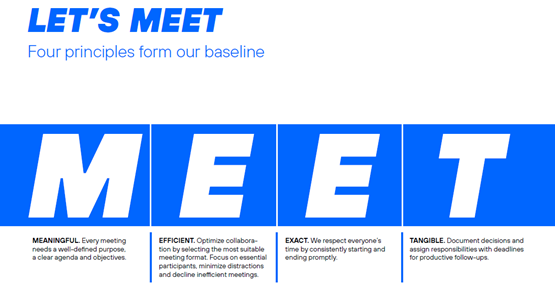Meetings are an undeniable part of our business life, they consume valuable time and often make us wonder whether they could have been condensed into a simple email. Yet despite their potential for efficiency, meetings persist as a cornerstone of organisational culture. Why do we organisations struggle so much to hold effective and productive meetings?
In today’s fast-paced business world, productivity and efficiency are more important than ever. And for us as an organisation, it is essential to optimise all aspects of our operations. One area that often holds significant potential for improvement is the meetings culture. Meetings are essential to business life, but all too often they can become unproductive time sinks that hinder progress rather than facilitate it.
However, by transforming our meeting culture, we can unlock new levels of productivity and efficiency while fostering greater collaboration and creativity.
Understanding the paradox
At the heart of the matter is the concept of meeting culture, a complex issue woven with the threads of tradition, hierarchy and communication styles, accelerated by Covid-19. On the one hand, there is the need for structure and guidelines to ensure that meetings serve their purpose. On the other, there is the challenge of changing behaviours, overcoming complacency and resistance to new approaches.
In many companies, meetings have become a default mode of communication, a universal solution for addressing problems, making decisions and disseminating information. However, this default approach often leads to a proliferation of unnecessary meetings, draining resources and decreasing productivity. The paradox lies in the fact that while meetings are meant to improve collaboration and efficiency, they often have the opposite effect. Poorly structured meetings lack clear objectives, go off-topic and fail to engage participants effectively. As a result, valuable time is wasted and frustrations increase.
Breaking the cycle
Transforming the culture of meetings requires a multi-faceted approach that addresses both structural and behavioural elements. In recent months, we have conducted many pilot projects on the topic of meeting culture with the aim of understanding the symptoms, but also trying to identify the root causes.
Factors for changing behaviour in meetings
In summary, we see four key factors for changing behaviour in meetings:
- Establishing guidelines, principles and standards to address key issues
- Encourage members to be responsible in presenting their issues.
- Taking adaptability as a cultural driver
- Apply interventions in the appropriate order to challenge the status quo.
MEET: the guidelines to make your meetings more productive
Last March we launched a set of meeting guidelines, called MEET, as a framework for productive discussions. MEET stands for Meaningful, Efficient, Exact and Tangible, embodying our commitment to making every meeting count.

Promoting accountability
Leaders play a critical role in modelling and reinforcing positive behaviours in meetings. By holding themselves and others accountable for adhering to meeting guidelines, leaders can set expectations and drive top-down cultural change.
Tailoring meetings to needs
An effective meeting culture recognises that there is no single standard. Companies must be willing to adapt their meeting practices to the needs of different teams, projects and objectives. This may involve experimenting with alternative formats, but also reflecting honestly on the environment chosen for each meeting. Face-to-face meetings are invaluable, especially when it comes to problem solving and innovation.
Challenging the status quo and overcoming resistance
Resistance to change is a natural human instinct, rooted in fear of the unknown and reluctance to alter familiar routines. Transforming the culture of meetings requires confronting this resistance head-on, and sometimes it also needs a little nudge. With MEET interventions, such as adding a “meeting budget calculator” or implementing “doomsday” (deleting all meetings from the calendar for a certain time), we can break daily routines and awaken our conscience about established meeting behaviours.
At O2 Telefónica, we have embarked on this journey towards a more efficient and productive meetings culture. I will keep you updated on our learnings, tricks and our journey towards transforming meetings into meaningful, efficient and tangible experiences.
I hope this text has inspired you to question your own meeting behaviour or helped you to turn your next meeting into an email or to have a structured pre-reading.












